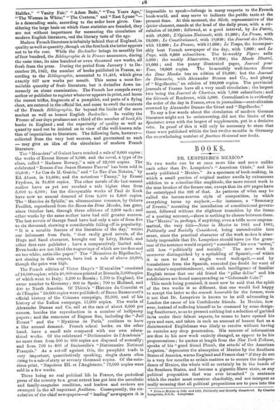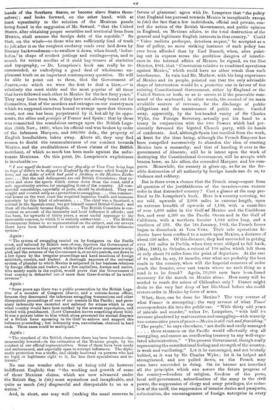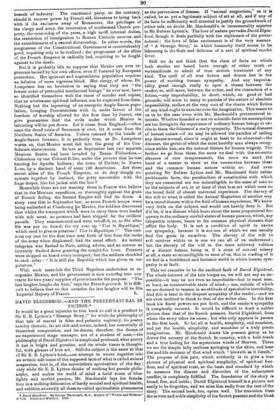BOOKS.
DR. LEMPRIERE'S MEXICO.*
No two works can be at once more like and mole unlike each other than Dr. Lemptiere's "American Crisis," and his newly published "Mexico." As a specimen of book-making, in which a small portion of original matter swells by extraneous addition to a crinoline-like amplitude, the more recent work is the true brother of the former one, except that its 480 pages have far outstripped the 296 of that. As patterns of what may be called the harum-scarnm style of composition, in which everything tarns up auyhow,—for instance, a "Summary of Events," narrating the installation of constitutional govern- ment, followed without the slightest, transition by the items. of a posting account,—there is nothing to choose between them. The "Mexico" is, perhaps, if anything, even a trifle more ungram- matical, the very title—Notes in Mexico in 1861 and 1862, Politically and Socially Considered, being unrenderable into sense, since the practical character of the work makes it abso- lutely impossible that Dr. Lempriere should have (as the gram- mar of the sentence would require) " considered" his own "notes," still less "politically and socially." The new work is moreover distinguished by a sprinkling of Spanish,—of which it is rare to find a single word well-spelt,— and by translations from the Spanish, executed (no doubt for want of the writer's superintendence), with such intelligenca of familiar English terms that our old friend the "pillar dollar" and hie subdivisions are found masquerading as "Colonnade. Coin !"
This much being premised, it must now be said that the spirit of the two works in so different, that one would feel happy to accept the latter as the anzende honorable for the former, were it not that Dr. Lempriere is known to be still advocating in London the cause of his Confederate friends. In Mexico, how ever, instead of suffering himself to be crammed by some design- ing Southerner, so as to present nothing but a selection of garbled facts under their falsest aspects, he seems to have opened his eyes and ears, and taken in such an amount of honest fact as a disinterested Englishman was likely to receive without having to exercise any deep penetration. His sources of information are thus in his new work entirely changed, as appear to be his prepossessions ; he quotes at length from the New York Tribune, speaks of his "good friend Plumb, the attaché of the American Legation," deprecates the absorption of Mexico by the Southern States of America, warns England and France that "if they do not in a very few months so ordain matters as to secure the indepen- dence of Mexico, the whole will as certainly be in the hands of the Southern States, and become a gigantic Slave state, as any political proposition that was ever broached" (a sentence which the reader must construe charitably, and not interpret as really meaning that all political propositions are to pass into the
• • Notes in Mexico in 1861 and 1862, Politically and Socially Considered. By Charles Lempriere, Longmane.
hands of the Southern States, or become slave States them- selves); and looks forward, on the other hand, with at least equanimity to the solution of the Mexican puzzle being found in the suggestion of Mr. Seward, "that the United States, after obtaining proper securities and territorial liens from Mexico, shall assume the foreign debt of the republic." So that, on the whole—to those who are sufficiently fond of truth to jolt after it on the roughest corduroy roads ever laid down by literary backwoodsman—to swallow it down, when found, bolus- bolus,' in shape of crudest jottings and cuttings—yea, and to search for veriest needles of it amid hay-trusses of statistics and topography, — Dr. Lempriere's book can really be re- commended, as embodying a good deal of wholesome un- pleasant truth on an important contemporary question. He will be able to point out to them, that the Government of Juarez,—to which we were the first to deal a blow,—" is relatively the most stable and the most popular of all those that have followed each other in Mexico for the last forty years." They may learn from him, if they have not already found out for themselves, that of the murders and outrages on our countrymen which we supposed ourselves bound to avenge upon that Govern- ment, not one has been perpetrated by it, but all by its oppo- nents, the allies and proteges of France and Spain ; that by these was committed the scandalous outrage upon the British Lega- tion (16th Nov., 1860), when its official seal was broken by order of the infamous Marquez, and 660,000 dole., the property of English bondholders, taken away. Above all, they may find reason to doubt the immaculateness of our conduct towards Mexico, and the creditableness of those claims of the British merchant, of which so much has been made against the unfor- tunate Mexicans. On this point, Dr. Lempriere's explicitness is invaluable :— "1 saw myself the boats' crews of our flag-ship at Vera Cruz bring bags on bags of dollars to be shipped to England by the steamer which brought me home, not one dollar of which had paid a farthing to the Mexican Exche- quer. . . . But the real delinquents are our British Consulates ; they re- ceive and store the specie which comes down from the coast, until a safe opportunity arrives for smuggling it out of the country. All com- mercial consulships, especially at ports, should be abolished. They are sought and coveted solely as a protection to smuggling. . . . One commer- cial house on the west coast has acquired immense wealth and immense notoriety by this kind of adventure. . . . The chief was a Spaniard, a colonel in the Spanish many, but got himself named British Consul ; and then all the family became English. . . . The British Consulate is con- venient on account of the immunity and local influence it affords ; and has been, for upwards of thirty years, a most useful appanage to the mercantile concern, to which it is entirely subservient. . . . The British Government listens to no representation' on the subject, and our envoys there have been influenced to connive at and support the infamous system."
Again :
"The system of smuggling carried on by foreigners on the Pacific coast, and enforced by British men-of-war, deprives the Government of nearly all revenue in that quarter, while in the Gulf ports commerce is crip- pled, and the revenue of the Government is, at certain periods, cut down to a low figure by the irregular proceedings and hard exactions of foreign ministers, consuls, and traders. A thorough exposure of the universal system of plunder to which Mexico is subjected in her business relations by foreign officials and traders, and a few capitalists, foreign and native, who mostly reside in the capital, would prove that the Government of that country is defrauded out of more than three-fourths of its lawful revenue."
Again :
"Some years ago there was a public prosecution by the British Legs.. thou of a member of Congress (Zarco), and a custom-house officer, because they denounced the infamous smuggling transactions and other disreputable proceedings of one of our consuls in the Pacific ; and pecu- niary indemnity was executed and enforced for crimes which in any other country would have been marked by the severest reprobation, and visited with punishment. (Lord Clarendon knows something about this). It was a private letter to him which alone prevented the eternal disgrace of a British force appearing in the Gulf to enforce and support this infamous proceeding ; but indemnity was, nevertheless, obtained in hard cash. These cases could be multiplied."
Again :
"The standard of the British character there has been lowered—im- measurably lowered—in the estimation of the Mexican people, by the conduct of our official representatives. Some of them have been needy and embarrassed, and especially open to corrupt influences. The diplo- matic protection was a traffic, and chiefly bestowed on persons who had no legal or legitimate right to it, far less their speculations and in- terests."
No one can wonder after this at being told (in however indifferent English) that "the working and growth of some .of these Mexican claims, which are now advanced under the British flag, is (sic) most mysterious and inexplicable, and .quite as much (sic) disgraceful and disreputable to us as a nation,"
And, in short, one may well (making the usual reserves in
favour of gfammar) agree with Dr. Lempriere that "the policy. that England has pursued towards Mexico is inexplicable except in (sic) the fact that a few individuals, official and private, con- trol the action of the British Government, and public opinion in England, on Mexican affairs, to the total destruction of the general and legitimate English interests in that country." Could "Video meliora proboque, deteriora sequor," be accepted as a line of policy, no more striking instance of such policy has ever been afforded than by Earl Russell, when, after point- ing out in express terms the profitless dangers of interfer- ence in the internal affairs of Mexico, he signed, on the 31st October, 1861, that "Convention relative to combined operations against Mexico," which could have no other result than such interference. In vain had Mr. Mathew; with his long experience of Mexico and its people, pointed out that the only advisable shape of intervention would be a protective one in favour of tile existing Constitutional Government, either by England or the United States, or both, so as to secure to it the peaceable com- mand of the sea-board ; in other words, the control of its main available sources of revenue, for the discharge of public obligations and the maintenance of public order. Canied away, apparently, by the hot-beaded vanity of Sir Charles Wyke, the Foreign Secretary, actually put his hand to a treaty in conjunction with the two Powers which had per- sistently favoured the bigoted Church party, with its bands of cutthroats. And, although Spain has recoiled from the work, at least for the time being, although the French Emperor has been compelled successively to abandon the idea of erecting Mexico into a monarchy, and that of handing it over to the government of Almonte, still he is intent upon the work of destroying the Constitutional Government, still he accepts with brazen brow, as his allies, the scoundrel Marquez and his com- peers. Meanwhile, the country is given up, as far as the for- cible destruction of all authority by foreign hands can do so, to violence and robbery.
But is there even a chance that the French army—apart from all question of the justifiableness of the invasion—can restore order in that distracted country? Cast a glance at the map pre- fixed to Dr. Lempriere's book. Here is a country covering, we are told, upwards of 2,000 miles in extreme length, upon an extreme breadth of upwards of 1,100, with a coast-lino of over 1,600 miles in the Guile Mexico and the Caribbean Sea, and over 4,200 on the Pacific Ocean and in the Gulf of California, with a northern frontier 1,792 miles long, and a southern of 532. On the 7th January, 1861, the French forces began to disembaik at Vera Cruz. Their solo operations hi- therto have been confined to a march upon Mexico, a distance of about 256 miles. Of this distance, they had succeeded in getting over 192 miles to Puebla, when they were obliged to fall back, (May, 1861), to Orizaba, a retreat of 108 miles, which left them at only about 84 miles from the point of departure. At the rate of 81 miles in, say, 10 months, over what are probably the best roads in the country, when will the Imperial restorers of order reach the frontier, over vast tracts where no such thing as a road is to be found ? Again, 70,000 men have been found necessary for the march on Mexico alone. How many will be needed to reach the mines of Chihuahua only ? France might drain to the very last drop of her life-blood before she could restore order in Mexico by force of arms.
What, then, can be done for Mexico ? The very reverse of what France is attempting ; the very reverse of what Times' correspondents din into the public ear. "With thirty odd years of misrule and murder," writes Dr. Lempriere, "with half its revenue plundered by malversation and smuggling—with scarcely two consecutive years of peace—Mexico is still rich and flourishing." "The people," he says elsewhere, " are docile and easily managed . . . . three steamers on the Pacific would effectually stop all smuggling, and ensure an overflowing treasury to any well-regu- lated administration." "The present Government, though really representing the constitutional feeling and strength of the country, is weak and vacillating." Let it be encouraged, and not brutally bullied, as it was by Sir Charles Wyke ; let it be helped and strengthened, and not pulled down, as the French may soon have succeeded in doing.. On its banner are inscribed all the principles which can assure the future progress of the country—freedom of religion, freedom of the press, local self-government, subordination of the army to the civil power, the suppression of clergy and army privileges, the reduc- tion of the tariff, the suppression of interior duties and passports, colonization, the encouragement of foteign enterprise in every branch of industry. The reactionist party, on the contrary, should it recover power by French aid, threatens to bring back with it the exclusive sway of Romanism, the privileges of the clergy and army, the restoration of confiscated Church pro- perty, the censorship of the press, a high tariff, internal duties, the restriction of immigration to Roman Catholic sources, and the establishment of a central dictatorship. In other words, the programme of the Constitutional Government is unmistakeably good, requiring only to be realized ; the programme of the allies of the French Emperor is radically bad, requiting to be fought against to the death.
But it is probably idle to suppose that Mexico can ever re- generate herself by her own efforts, even if fostered by European protection. Her ignorant and superstitious population requires an infusion of more vigorous blood. Her clergy, of whom Dr. Lempriere has no hesitation in saying that they are "the lowest order of pretended intellectual beings" he ever saw, have so identified themselves with the cause of murder and rapine, that no wholesome spiritual influence can be expected from them. Nothing but the inpouring of an energetic Anglo-Saxon popu- lation, bringing Protestantism with it, under favour of the freedom of worship allowed for the filet time by Juarez, can give guarantees that the evils under which Mexico is labouring will be put down. Let it come from England,—when once the dread crisis of Secession is over, let it come from the Northern States of America. Unless rescued by the hands of Anglo-Saxon freemen, it is perfectly true, as Dr. Lempriere warns us, that Mexico must fall into the grasp of the Con- federate slaveowners. So late as September last two separate Mexican States had been invaded by Texan Filibusters,— Chihuahua by one Colonel Beller, under the pretext that he was hunting for Apache Indians ; the town of Piedras, in Nuevo Lcon, by a distinct baud of some 120 Americans. Are these secret allies of the French Emperor, or do they simply co- operate together by instinct, the petty manstealer with the huge despot, like the jackal with the lion ?
Meanwhile there are not wanting those in France who believe that in the Mexican expedition, so thoroughly against the grain of French feeling, the Second Empire will find its doom. A story runs that in September last, as some French troops were being embarked at Cherbourg for Mexico, the soldiers discovered that whilst the transports wha were to carry them were loaded with salt meat, no potatoes had been shipped for the soldiers' gamelle. They remonstrated and were rebuffed, so, as file after file was put on board, the cry rose up "Vice la Republique," which used to give us potatoes ! Vice lz Republique 1" The omi- nous cry (not for the first titris sent forth of late from the ranks of the army when displeased) had its usual effect. An instant telegram was flashed to Paris, asking advice, and an answer as instantly flashed down granting the sought-fur boon. Potatoes were shipped on board every transport; but the soldiers chuckled to each other : " It is still the Republic which has given us our potatoes."
With such materials the Third Napoleon undertakes to re- organize Mexico, and his government is now catering into con- tracts for two years' supplies of provisions for the purpose. "The last laugher laughs the best," says the French provetb. It is diffi- cult to believe that on this occasion the last laugher will be His






























































 Previous page
Previous page